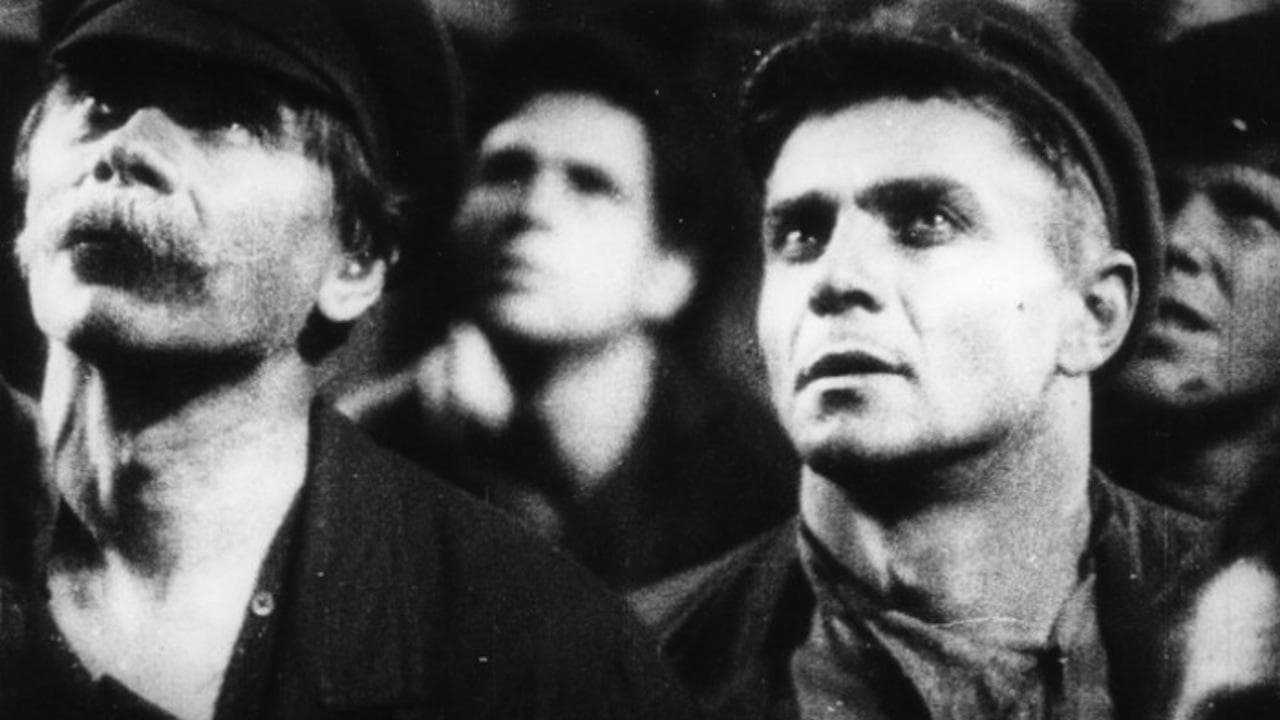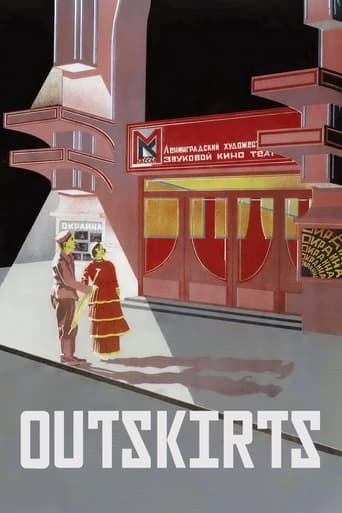

What makes it different from others?
... View MoreClever and entertaining enough to recommend even to members of the 1%
... View MoreMostly, the movie is committed to the value of a good time.
... View MoreThere are moments in this movie where the great movie it could've been peek out... They're fleeting, here, but they're worth savoring, and they happen often enough to make it worth your while.
... View More"The Outskirts (Okraina)" follows several stories as villagers in a far-distant Russian town are faced with war, a strike, a prisoner-of-war camp, and the effects and aftershocks these all bring. The town the film begins in is struggling with the shocks and effects of war, and the film follows those effects in multiple story lines. The ways that the war is used vary, from a factory strike brought on by the harshness of the times, to a young woman and her budding relationship with a German prisoner of war, to the shoe factory strike, to the soldiers at the front lines. As with many other Soviet films, there are many semi-leading and leading characters, and these film is constantly shifting between groups of characters and stories we are following. There are also tertiary characters being effected by the war as well. The transition from the more comedic parts to the horrors of war are quick, and often very abrupt. The clumsiness of the story comes from the odd pacing, with too-long bouts of time spent in the various places where the film takes place, making it difficult to transition back to the other story lines easily. The film is clearly struggling to fit the appropriate criteria laid forth by the Soviet Union, to tell the right story with the appropriate characters and the right messages. The stories we follow are compelling in and of themselves but the choppy pacing and the lack of technical finesse detract from the overall quality of this complex, multi-layered war film.
... View MoreOutskirts is the story of one town from the outbreak of WWI and into the beginning of the revolution. It follows a few separate story lines—a few of these story lines include a father and his two soldier sons; a girl, her German POW love and her awful, anti- revolution father. This series of subplots was entertaining—it allowed for a lot of issues to be tackled: the soldiers on the front and the POWs in the town provided a look at the war and some of the issues the Russian people were faced with during WWI. While it didn't even begin to show the incredible struggles and loss, it did convey the feeling that the Russians did not want to be fighting the war. There was also the love story that did a good job of showing the common humanity between the Germans and the Russians. The series of subplots, however, were also quite confusing. None of the scenes really came full circle, and a lot of them left me with more questions than I got answers. Even in the end when the revolution was beginning to come full circle, the subplot method did more to confuse than anything. My other thoughts on this film are related to its ideological content. It doesn't seem to focus too much on ideology until the end and then it is sort of in a frantic way that tries to cram all of it into a very small period of time. This seems strange to me since it was made in 1933, the heyday of the party minded film. Despite some of the film's shortcomings—such as the confusion— it was still an enjoyable 90 minutes.
... View MoreBoris Barnet's 1933 film Outskirts was created during a time when the only films acceptable for public Soviet cinemas had to obey the motto: "films for the millions." If it was not simplemindedly portraying Communism, the Revolution, or the Party's role in improving Soviet life, it was not screened. Every viewer had to be able to understand their message about these themes. Although Outskirts did indeed depict Soviet class struggle, its relationship with World War I, and the Revolution, it did so in a way that very few contemporary moviegoers could fully understand. I say this because even I, a modern viewer with much more cinema-watching experience than the common Soviet citizens of the 1930s, had trouble following the film. Its many subplots were allowed to run their respective courses with little to no connection at all, and some of these subplots were not even adequately concluded. As a result, Outskirts provides little more than a series of incomplete stories with confusing messages at the end.To get right into it, the purpose of the German tenant at the Russian hotel is unclear—other than to perhaps depict bourgeois indulgence through whimsical games of checkers, why is he even in the film? All he does is play checkers, get angry at the bourgeois Russian owner at the outset of World War I, and leave without any further explanation. Furthermore, although the role of the captured German soldier is more understandable in the film's goal in representing Communist ideology, it was not concluded clearly at all. When the Russian shoemaker protected the German soldier as being "a fellow shoemaker" against the wounded Red Army soldiers, he made a point about the fact that Proletarian struggles transcend national borders, but what happened to the German soldier afterwards? Was he a convinced Communist? Did he fight again in the war? Outskirts failed to answer any of this.While all of this is going on, there are even more subplots—the relationship between the Russian shoemaker and his superior shoe factory owner with a large government order of boots, his two sons who fought and died in the war, an emerging love story between the Russian hotel owner's daughter and the captured German soldier, and a final sequence where the shoemaker may have murdered the hotel owner during the Revolution. There is a point where as a viewer, I have to say enough is enough. Although most of these do in fact represent Communist themes, I feel that Outskirts was a desperate attempt to compress the entire Party's ideology into one movie. In my opinion, the film's grand scope is what led to its confusing message and consequent failure.
... View MoreThe remarkable qualities of this early sound film pertain to it's stunning use of sound which is inventive and innovative by any and all standards, the stunning camera movements and long takes. Just as remarkable is the storytelling which plays like a series of short stories and sketches rather than a novella or novel. Yet it doesn't break these short stories into segments or blocks or frame it unlike other attempts at multiple short narratives in a feature.The movement between the various segments and stories is very poetic like from one Greek chorus to another. The central conceit being between the conflict between the war frontlines and the homefront of the village. The scenes of warfare shown in this film is harsh and brutal in a way that anticipates Roberto Rossellini's or Samuel Fuller's later films.What makes it even more harsh is the sense of futility in the conflict. As the infantrymen who fight each other in the trenches have more in common than either would do with their civilian countryman, anticipating Renoir's La Grande Illusion. One breathtaking scene is when one Russian soldier saves a German from getting bombed and then tells him after their initial celebration that he'll be their prisoner now.Equally moving is the tender love story between a Russian girl Anka and a German POW given permission to work in the village. This love story is made possible because Anka's father's friend Robert Karlovish, a German taught her enough about his country to escape the xenophobia of that community at war. Also interesting is the sense of homoeroticism, neither vulgar nor campy, among the various male characters. Early in the film when the soldiers leave for the front there is a wonderful shot of two men kissing each other on the lips which is shown casually without any sense of sensation in the presentation of this scene. Barnet in his film shows that despite the conflict, the violence, the sense of division among his characters(all acted superbly conveying a naturalism absent in many early talkies) there is always a brief glimpse of what things could be or should be.Even if for reasons of propaganda the film ends with the parade of saviour communists, Barnet has managed to create a film that transcends that all the more by ending the film in a shot worthy of Dovzhenko(a key influence on this film) where a character after hearing the arrival of the commmunists, breathes close to death, "What a rush!" and presumably dies off-screen. The world of this film belongs to people, to human relations and not to party lines.
... View More